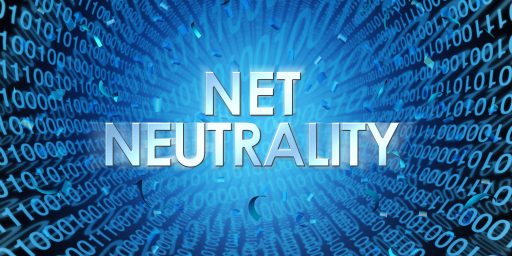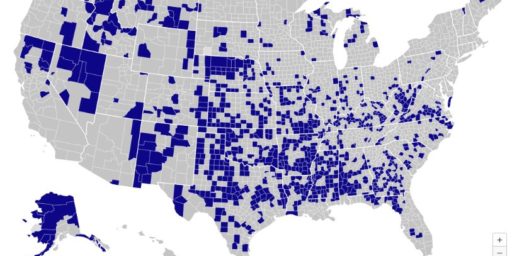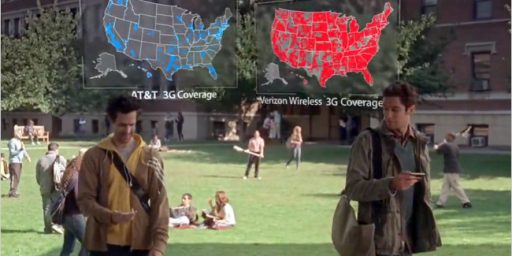Google and Verizon Test Net Neutrality
Congress has been wrestling with the net neutrality issue for years. Two major players may force a decision soon.
Congress has been wrestling with the net neutrality issue for years. Two major players may force a decision soon.
NYT (“Google and Verizon Near Deal on Pay Tiers for Web“):
Google and Verizon, two leading players in Internet service and content, are nearing an agreement that could allow Verizon to speed some online content to Internet users more quickly if the content’s creators are willing to pay for the privilege. The charges could be paid by companies, like YouTube, owned by Google, for example, to Verizon, one of the nation’s leading Internet service providers, to ensure that its content received priority as it made its way to consumers. The agreement could eventually lead to higher charges for Internet users.
Such an agreement could overthrow a once-sacred tenet of Internet policy known as net neutrality, in which no form of content is favored over another. In its place, consumers could soon see a new, tiered system, which, like cable television, imposes higher costs for premium levels of service.
Any agreement between Verizon and Google could also upend the efforts of the Federal Communications Commission to assert its authority over broadband service, which was severely restricted by a federal appeals court decision in April.
People close to the negotiations who were not authorized to speak publicly about them said an agreement could be reached as soon as next week. If completed, Google, whose Android operating system powers many Verizon wireless phones, would agree not to challenge Verizon’s ability to manage its broadband Internet network as it pleased.
[…]
At issue for consumers is how the companies that provide the pipeline to the Internet will ultimately direct traffic on their system, and how quickly consumers are able to gain access to certain Web content. Consumers could also see continually rising bills for Internet service, much as they have for cable television. The prospect of a Google-Verizon agreement infuriates many consumer advocates, who feel that it would concentrate in a few corporations control of what to date has been a free and open Internet system in which consumers decide which companies are successful. “The point of a network neutrality rule is to prevent big companies from dividing the Internet between them,” said Gigi B. Sohn, president and a founder of Public Knowledge, a consumer advocacy group. “The fate of the Internet is too large a matter to be decided by negotiations involving two companies, even companies as big as Verizon and Google.”
[…]
Cable and telephone companies want free rein to sell specialized services like “paid prioritization,” which would speed some content to users more quickly for a fee. Wireless companies, meanwhile, want no restrictions on wireless broadband, which they see as a different technology than Internet service over wires. Many content providers — like Amazon, eBay and Skype — prefer no favoritism on the Internet or they want to be sure that if a pay system exists, all content providers have the opportunity to pay for faster service.
The F.C.C., meanwhile, favors a level playing field, but it cannot impose one as long as its authority over broadband is in legal doubt. It has proposed a solution that would reclassify broadband Internet service under the Communications Act from its current designation as an “information service,” a lightly regulated designation, to a “telecommunications service,” a category that, like telephone service, is subject to stricter regulation.
Bloomberg (“Google, Verizon Said to Strike Deal on Web Traffic Rules“):
Verizon Communications Inc. and Google Inc. have struck their own accord on handling Internet traffic, as both participate in talks by U.S. officials on Web policy, two people briefed by the companies said. The compromise as described would restrict Verizon from selectively slowing Internet content that travels over its wires, but wouldn’t apply such limits to Internet use on mobile phones, according to the people, who spoke yesterday and asked not to be identified before an announcement.
Verizon and Google have been adversaries over the issue, known as net neutrality. Verizon was among cable and phone companies saying they need leeway over the delivery of Web content to protect performance of their networks. Google led content providers and advocacy groups that say restrictions are needed so communications companies don’t favor their own online offerings or those of partners.
The Federal Communications Commission is negotiating behind closed doors with Verizon, Google, AT&T Inc. and other companies on rules proposed by Chairman Julius Genachowski to regulate how phone and cable companies handle Web traffic such as Google’s YouTube videos. Regulations or legislation that result would bind Google and Verizon as well.
WaPo (“Verizon, Google make net neutrality pact, sources say“):
Google and Verizon’s agreement could prevent Verizon from offering some prioritization to the biggest bidders who want better delivery of content on its DSL and fiber networks, according to the sources. But that wouldn’t apply to mobile phones, the sources said, speaking on the condition of anonymity because the companies have not officially made their announcement. And Verizon could offer some managed services — better quality to some Web sites such as those offering health care services, the sources said. But some analysts speculate that managed services could also include discounted YouTube and other services to FiOs customers at better quality.
Om Malik of GigaOm (“Did Net Neutrality Just Get Knifed in The Back?“) says this “shouldn’t come as a surprise” but terms it “the first step in what would amount to the slow asphyxiation of network neutrality.”
Given the recent ruling limiting FCC authority, it strikes me that the time is ripe for Congress to come to an agreement on the broad principles here and enact legislation giving the agency a roadmap for regulation. Of course, as Senator Chris Dodd noted yesterday on an entirely different matter, “not much happens” at this point in an election cycle, so we’re looking at January, at soonest, before any substantive action.
I’m in the online business, so I’ve been aware of and thinking about this issue for years. And, for the life of me, I don’t know what the right solution is.
Fundamentally, I think access to the Internet should be a public good, with all companies treated equally. A college student with a good idea ought to be able to compete with monoliths like Google, Microsoft, and Amazon on equal footing in terms of the ability of potential customers to access their products online. And the NYT shouldn’t be able to stifle competition from bloggers simply by virtue of being able to buy faster access to the commons.
At the same time, however, someone has to pay for the infrastructure. And, right now, that’s the cable and phone companies and other providers. Given limited capacity, it’s not entirely unreasonable that, say, access to newspapers and other low bandwidth sites ought be privileged over, say, movie downloads. Further, the money for innovation has to come from somewhere.
UPDATE: Google and Verizon both issued denials later in the day. Given the number of prominent sources reporting the story, I’m inclined to believe that something either is or was in the works. Perhaps this was a trial balloon to gauge public and industry reaction.







“Given limited capacity, it’s not entirely unreasonable that, say, access to newspapers and other low bandwidth sites ought be privileged over, say, movie downloads. ”
On a purely digital level, it doesn’t matter whether the packets are newspapers or movie downloads. With a movie, obviously, there will be more packets, but it’s still all just 1s and 0s.
I think that internet speeds should be tiered, and the cost of the speed should be borne by the user. If you’re willing to pay your ISP for a super-fast connection, then Google (nor anyone else) should be able to slow it down for you. Period.
Er….missed a word.
“then Google (nor anyone else) should NOT be able to slow it down for you. Period.”
The internet continues to deliver amazing things. This despite it being a pretty sub-optimal mix of private, public, and comand-and-control systems. They are working pretty well, but they could be much better.
Did you touch on the gateway providers (local cable companies) being government enforced monopolies?
Verizon is actually in the next town over (with their FIOS system), but I can’t get it because my town cut a deal with a different provider for their monopoly. Verizon is prohibited by law from throwing a cable over the river.
This sure ain’t a free market.
Actually, the way to look at the possible danger is this:
Let’s say my cable provider cuts a deal with Microsoft instead of Google, but I prefer fast Google access. What are my options? To sell my house and move?
I have a compromise that could satisfy both internet service providers and those of us that have enjoyed net neutrality up to now.
I think internet service providers, like Comcast and Verizon, should be able to prioritize internet traffic by type. In other words, they can give preference to voice and / or video over email. If an internet service provider does prioritize internet traffic by type, they should be required to tell their customers that they are doing this. I think that this type of prioritization would be a selling point, though.
However, internet service providers should be forbidden by law or regulation from prioritizing internet traffic by source. In other words, YouTube videos shouldn’t be given precedence over Hulu videos because Google is willing to pay more.
This compromise allows internet service providers to provide customers with what they want, while preserving the ability of the college student with a good idea to compete with Google.
While I tend to be a supporter of Net Neutrality in theory, I kind of have to laugh when I consider Congress and the government attempting to actually enforce it. The Internet (and I use that as a catchall of the technology, the infrastructure, the legal agreements, etc.) has gotten far too complax for congress to put limitations on it, if they had even a basic grasp of it. The technology companies will do what they want to do, similar to what the big financial groups do.
While I know it is coming, I don’t trust Comcast and most of the other ‘Gateway’ Companies regarding access to content as long as they can make a buck. Sooner or later someone is going to realize they can also start discriminating for content, not just bandwidth/profit (kind of like China does now) and that, in my opinion, is just bad.
This is a case where getting more free market and providing consumers with more choices would be very helpful, but I don’t really see that happening either.
By the way, Google is denying this story and saying that the NYT is simply wrong. On the other hand, Verizon is confirming something or another …
Here’s the link: http://www.pcmag.com/article2/0,2817,2367436,00.asp
“The New York Times is quite simply wrong,” a Google spokeswoman said in an e-mail. “We have not had any conversations with Verizon about paying for carriage of Google traffic. We remain as committed as we always have been to an open Internet.”
There’s all kinds of problems with trying tot teir the net. The biggest is probably the fact that most people have very little choice in ISP. Where I used to live I could only get dial up that connected at 2400-14.4k or 900mhz wireless which usually worked (when it wasn’t down for a month at a time) and would sometimes hit 50KB/s but wouldn’t let me go to newegg…
This is why it’s nice to have a geek in the family. The kid says the story is bogus.
@JJ
“A college student with a good idea ought to be able to compete with monoliths like Google, Microsoft, and Amazon on equal footing in terms of the ability of potential customers to access their products online. And the NYT shouldn’t be able to stifle competition from bloggers simply by virtue of being able to buy faster access to the commons.”
Right. However, as Milton Friedman told me once, businesses want free enterprise for themselves but not for their competitors.
Anybody up for a National Public Internet? just askin’
Since the Internet was developed by the DOD, once could argue we already have that.